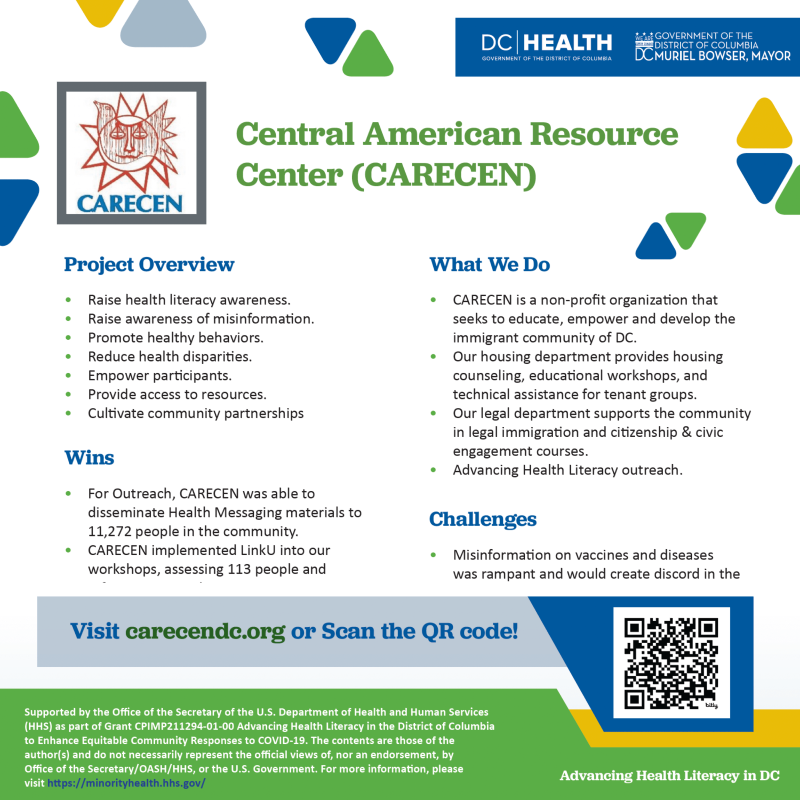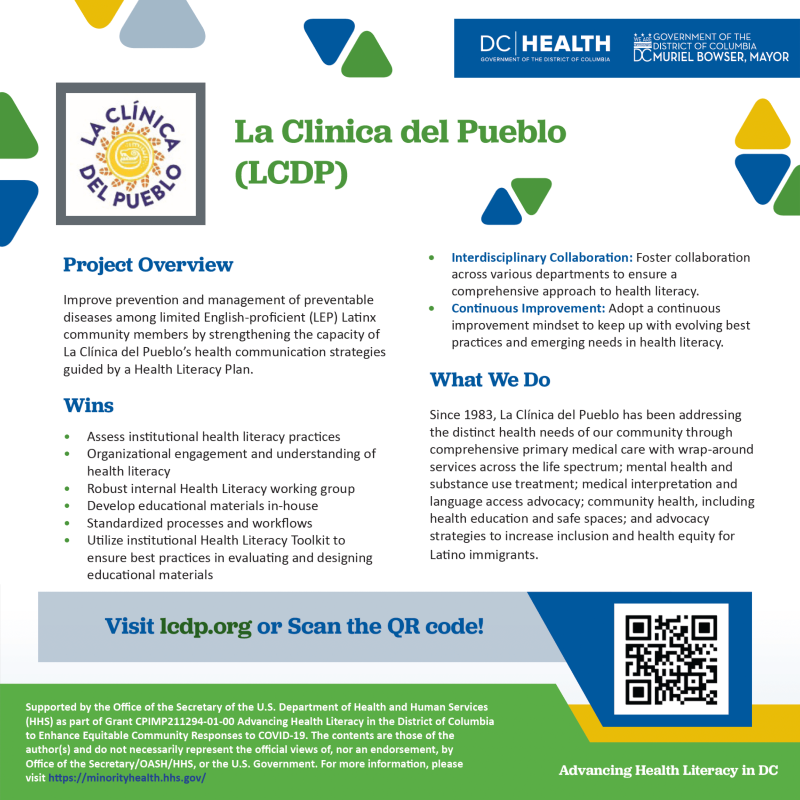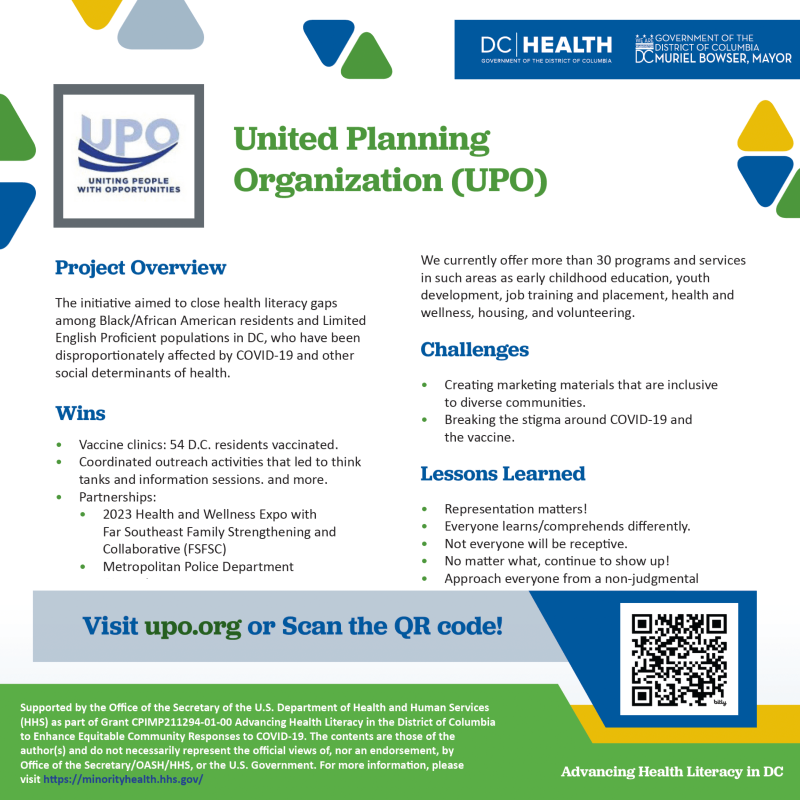CBO Partners
A team of community non-profit organizations, with demonstrated track-records in connecting with key focus communities, were selected to be part of a collaborative learning space that would engage, support, and learn both from and with each other and DC Health.
These community partners (all but one being a non-health related organization) function as effective ‘bridges’ in their communities, connecting their residents and constituents to the healthcare system.
Each organization uniquely implemented project activities that aligned and expanded community-based, culturally, and linguistically appropriate health literacy engagement and intervention efforts. As each community partner worked to increase health literacy in their communities, in parallel, they were developing health literacy internally at their organizations.

Central American Resource Center (CARECEN)

(PDF)
- Raise health literacy awareness.
- Raise awareness of misinformation.
- Promote healthy behaviors.
- Reduce health disparities.
- Empower participants.
- Provide access to resources.
- Cultivate community partnerships
- CARECEN is a non-profit organization that seeks to educate, empower and develop the immigrant community of DC.
- Our housing department provides housing counseling, educational workshops, and technical assistance for tenant groups.
- Our legal department supports the community in legal immigration and citizenship & civic engagement courses.
- Advancing Health Literacy outreach.
- For Outreach, CARECEN was able to disseminate Health Messaging materials to 11,272 people in the community.
- CARECEN implemented LinkU into our workshops, assessing 113 people and referring 16 people.
- Assisted over 244 Clients in our workshops through our DC Health initiatives.
- Misinformation on vaccines and diseases was rampant and would create discord in the classroom but created great conversations in the end.
- A continuous challenge; people will get their information from dubious sources that are not trusting government agencies and information.
- It’s very important to address misinformation head-on.
- It’s crucial to advance health literacy that language access is available to clients.
- “Meet people where they are.”

Far Southeast Family Strengthening Collaborative (FSFSC)

(PDF)
Our Advancing Health Literacy project aims to empower residents in ward 5,7, & 8 with the knowledge and skills needed to make informed decisions about their health and navigate the healthcare system effectively. Through targeted interventions and community engagement, we seek to address health disparities and improve health outcomes among vulnerable populations.
The mission of the Far Southeast Family Strengthening Collaborative is to act as a catalyst to develop, nurture and sustain partnerships of residents, agencies, and institutions in the Southeast community and to create a healthy socioeconomic environment through which every child and family has an opportunity to achieve their maximum potential and to lead a productive life.
- Increased awareness and understanding of health topics among target populations.
- Improved health behaviors and self-management skills among participants.
- Strengthened partnerships with community stakeholders and healthcare providers.
- Enhanced access to healthcare services and resources in underserved areas.
- Recognition of the importance of health literacy in improving health outcomes and reducing disparities.
- Limited resources and funding for implementing comprehensive health literacy programs.
- Addressing language and cultural barriers to effectively reach diverse communities.
- Overcoming resistance to health behavior change and overcoming misinformation.
- Adapting interventions to meet the evolving needs of target populations.
- Ensuring sustainability and scalability of health literacy efforts beyond the project duration.
- Investing in ongoing evaluation and data collection helps measure impact, identify areas for improvement, and demonstrate program effectiveness.
- Prioritizing health equity and addressing social determinants of health are integral to advancing health literacy and promoting health equity.

Health Literacy at American University (HEAL-DC)

(PDF)
- HEAL is a program developed by AU and works to improve health literacy levels and disparities throughout DC related to COVID- 19 and preventable diseases.
- Partners with faith and community- based organizations to host pop- up events for DC residents in wards 4, 5, 7, and 8.
- American University’s Healthy Schools, Healthy Communities Lab aims to advance health equity through policies and multi-level programs. The Lab engagesDC residents in community transformationthrough partnerships with schools, corner stores, supermarkets, and faith-based organizations. Our goal is to support meaningful change that can improve health outcomes for all.
- Partnerships with Urban Outreach Ministries and Pilgrim Rest Baptist Church, who offered great venues to provide health literacy information during their food distribution events and vaccination clinics.
- Partnerships with Urban Outreach Ministries and Pilgrim Rest Baptist Church, who offered great venues to provide health literacy information during their food distribution events and vaccination clinics.
- Scheduling conflicts and lack of responsiveness from potential community partnerships to our outreach.
- Language barriers at pop- ups if we did not have Spanish speaking team members that day.
- Students primarily comprise our pop- up team, so staffing was a challenge if events took place during long weekends, school breaks, or class time.
- In-person discussions and engagement are the most beneficial to our residents.
- Which survey questions to condense and how to tailor encounters into meaningful conversations.
- Promoting health is done best through collaboration and joining other community events such as food drives, vaccination clinics, and health fairs.

InnerCity Collaborative CDC (ICCCDC)

(PDF)
- Empowerment through Education: Worked with individuals in underserved communities by providing: Resources on how to navigate medical instructions, preventative care and the healthcare system.
- YouTube Channel @InnerCityCDC to engage young residents in conversations on understanding health literacy, chronic conditions, health literacy in the digital age and health literacy in policy and practice. Community Engagement. Actively engaged the community to understand their unique needs and challenges regarding health literacy.
- Sustainable Impact. Equipped individuals with the knowledge and skills necessary to make informed decisions about their health. By promoting health literacy, it contributed to long-term improvements in health outcomes and overall well-being.
- Our Mission. We seek to strengthen the lives of all in need by giving help that empowers and hope that lasts. Thus, we affirm and support the dignity of all human life, strengthen families, and serve the poor and most vulnerable
- Our Mission. We seek to strengthen the lives of all in need by giving help that empowers and hope that lasts. Thus, we affirm and support the dignity of all human life, strengthen families, and serve the poor and most vulnerable
- Our Values. We affirm the sacredness and dignity of all human life.
- Established Partnerships with UPO, FSFSC and East River FSC, Safeway, Giant and Aldi to host tabling information opportunities.
- Increasing Viewership & Subscribers to YOUTUBE Channel.
- Creating relevant content for Podcast and subject matter experts to interview.
- Consistency is key

La Clinica del Pueblo (LCDP)

(PDF)
Improve prevention and management of preventable diseases among limited English-proficient (LEP) Latinx community members by strengthening the capacity of La Clínica del Pueblo’s health communication strategies guided by a Health Literacy Plan.
Since 1983, La Clínica del Pueblo has been addressing the distinct health needs of our community through comprehensive primary medical care with wrap-around services across the life spectrum; mental health and substance use treatment; medical interpretation and language access advocacy; community health, including health education and safe spaces; and advocacy
- Assess institutional health literacy practices
- Organizational engagement and understanding of health literacy
- Robust internal Health Literacy working group
- Develop educational materials in-house
- Standardized processes and workflows
- Utilize institutional Health Literacy Toolkit to ensure best practices in evaluating and designing educational materials
- Implement regular training and capacity-building sessions for staff and CHW cohort.
- Limited financial and human resources dedicated to developing and sustaining health literacy strategies.
- Difficulty in simplifying complex medical information.
- Equity Focus: Prioritize health literacy to address health disparities and promote equity in healthcare delivery.
- Patient-centered approaches: Focus on language and cultural perceptions and needs to improve health literacy.
- Interdisciplinary Collaboration: Foster collaboration across various departments to ensure a comprehensive approach to health literacy.
- Continuous Improvement: Adopt a continuous improvement mindset to keep up with evolving best practices and emerging needs in health literacy.

Latin American Youth Center (LAYC)

(PDF)
Latin American Youth Center collaborated with DC Health and organizations across Washington, DC to identify and implement changes that increased our organizational ability to provide actionable and equitable services.
- Latin American Youth Center empowers a diverse population of youth to achieve a successful transition to adulthood through multicultural, comprehensive, and innovative programs that address youth’s social, academic, and career needs.
- 38 total referrals via LinkUDMV.org.
- More than 5 departments collaborated with Health Literacy to enhance services.
- Over 400 masks were distributed to clients.
- Staff and funding changes that impacted existing program plans.
- Defining and designing health literacy improvements for separated teams.
- Creating buy-in with stakeholders due to sustainability and demand concerns.
- Sustainability and buy-in require clear outcomes.
- Health literacy practices are best considered in development rather than revision.
- Staff and funding changes must be considered from the outset.

Leadership Council for Health Communities (LCHC)

(PDF)
- Training and Education for Residents
- Partner with local stakeholders to close the health literacy gap.
- Improve health outcomes through health education, outreach, and training.
Founded in 2011, Leadership Council for Healthy Communities is a faith-based organization dedicated to promoting healthy communities, addressing the challenges facing underserved families, and making lasting impacts in communities in the District of Columbia. We:
- Educate,
- Inspire, and
- Promote Healthy Behaviors
- Pop-Up Vaccination Clinics
- Community Outreach (Health Fairs)
- Health Messaging Development and Dissemination
- Increase in Partnerships
- Training Offered to Staff, Local CBOs, and Residents across priority Wards 5, 7, and 8.
Navigate program implementation with limited financial resources; Overcoming language barriers and cultural differences; Overcoming silos within healthcare and community-based organizations.
- Readable and Accessible Health Information
- Chronic Disease Management
- Closed-Loop Referrals

United Planning Organization (UPO)

(PDF)
The initiative aimed to close health literacy gaps among Black/African American residents and Limited English Proficient populations in DC, who have been disproportionately affected by COVID-19 and other social determinants of health.
Since 1962, the United Planning Organization (UPO) has focused on changing lives — supporting and inspiring Washington, DC’s low-income residents on their journey to self-sufficiency and success.
We currently offer more than 30 programs and services in such areas as early childhood education, youth development, job training and placement, health and wellness, housing, and volunteering.
- • Vaccine clinics: 54 D.C. residents vaccinated.
- • Coordinated outreach activities that led to think tanks and information sessions. and more.
- • Partnerships:
- 2023 Health and Wellness Expo with Far Southeast Family Strengthening and Collaborative (FSFSC)
- Metropolitan Police Department
- Giant pharmacy
- Living Well Workshops with DC Health’s Cancer and Chronic Disease Prevention Bureau
- Creating marketing materials that are inclusive to diverse communities.
- Breaking the stigma around COVID-19 and the vaccine.
- Representation matters!
- Everyone learns/comprehends differently.
- Not everyone will be receptive.
- No matter what, continue to show up!
- Approach everyone from a non-judgmental standpoint.
- More cross-generational educational content is needed for health literacy to address the gaps and bridge the unfamiliar.
